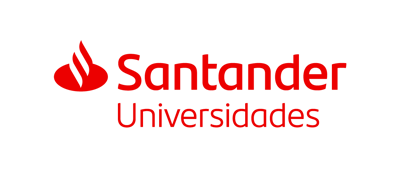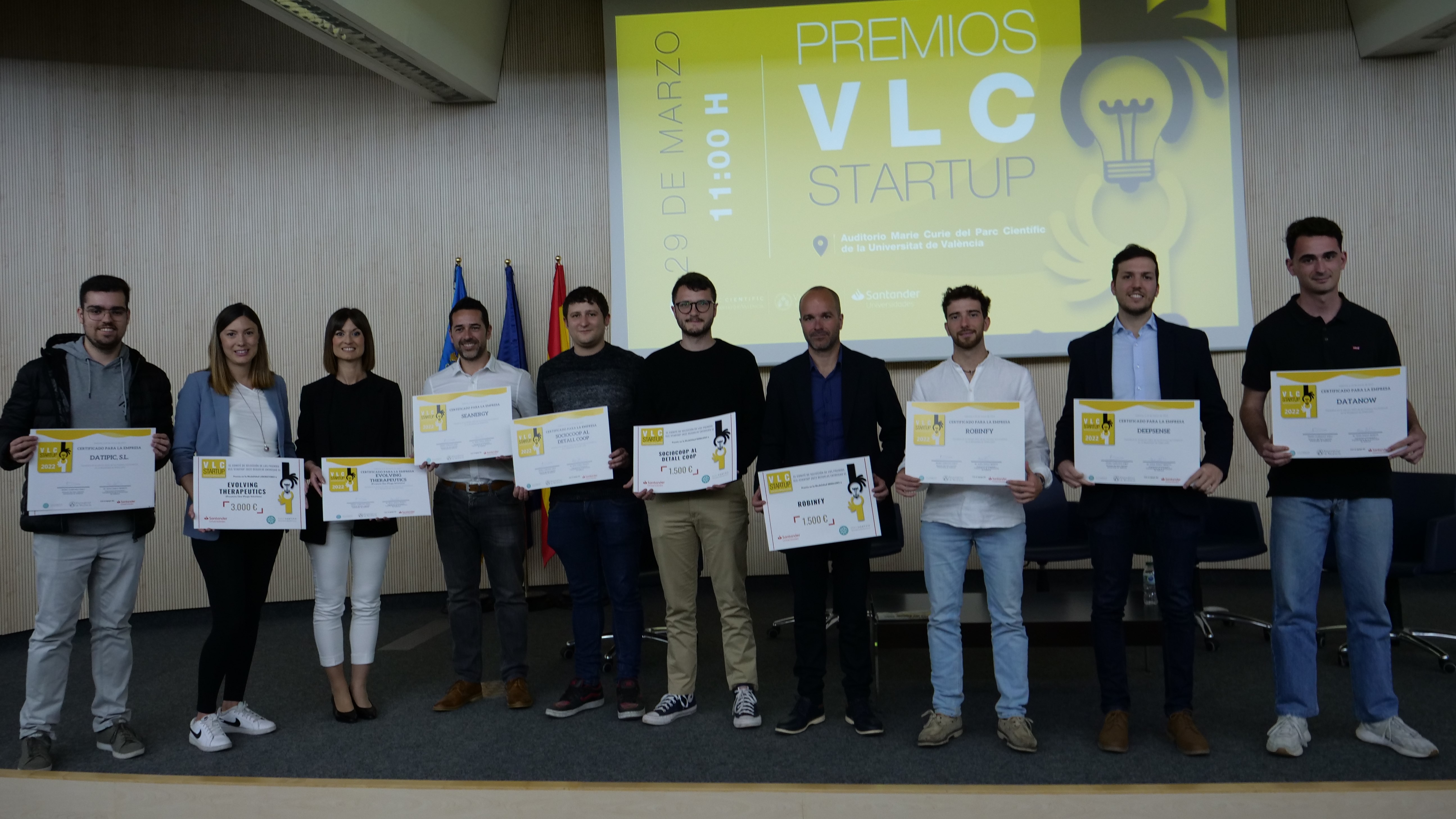The eighth edition of the program to support innovative companies, within the framework of the collaboration agreement signed by the Universitat de València and Banco Santander, culminates with the awards ceremony in the Marie Curie Auditorium of the PCUV.
For the eighth consecutive year, the Fundació Parc Científic Universitat de València (FPCUV) has been in charge of organizing the VLC/Startup call, the support program for innovative companies, which is part of a collaboration agreement signed between the Universitat de València and Banco Santander, with the aim of promoting and supporting the creation and consolidation of companies in the university environment of innovation.
"These awards recognize, above all, innovative applications of knowledge and technological development. In the winning companies, the diversity of disciplines and areas of application should be highlighted," explains Pedro Carrasco, director of the PCUV and member of the Committee. On these criteria, the most highly valued project in the Laboratory category corresponds to Evolving Therapeutics (One Phage Solutions Project), a company focused on the fight against multidrug-resistant bacteria, which seeks to develop products capable of preventing, treating and diagnosing bacterial diseases that are currently untreatable. As for the Seedbed modality, the most highly rated companies are Sociocoop Al Detall Coop, Robinfy, Universal Seanergy, Datipic, S.L., Datanow and Deepsense.
.jpg?width=700&height=394&name=P1266696%20(2).jpg)
Pedro Carrasco, director of the PCUV during the awards ceremony of the eighth edition of VLC/Startup. Photo: PCUV
"These awards recognize, above all, innovative applications of knowledge and technological development. Among the winning companies, the diversity of disciplines and areas of application is noteworthy," explains Pedro Carrasco, director of the PCUV and member of the Committee.
Along with Carrasco, Rosa Donat, vice rector of Innovation and Transfer of the UV and José Miguel Lorente, director of Institutions in the Territorial Management of the Valencian Community and Murcia of Banco Santander also participated in the awards ceremony. For her part, Donat stressed that "this type of initiative is one of the basic pillars on which we want to build the transparency policy of the University of Valencia."
Donat added that "the support and accompaniment part of the VLC/Startup program is essential, since what matters is that companies are integrated into the productive fabric of the community and produce wealth and quality jobs that within the Science Park will necessarily be related to the ability of the UV to feed this quality employment." Along the same lines, Lorente highlighted the "upward collaboration" that has been going on for 25 years between the University of Valencia and Banco Santander.
From right to left: Rosa Donat, vice rector of Innovation and Transfer of the UV; Pedro Carrasco, director of the PCUV; and José Miguel Lorente, director of Institutions in the Territorial Directorate Valencian Community and Murcia of Banco Santander. Photo: PCUV
"This type of initiative is one of the basic pillars on which we want to build the transparency policy of the University of Valencia," Rosa Donat, Vice Rector for Innovation and Transfer of the UV.
Opportunities and challenges of scientific entrepreneurship
During the VLC/Startup awards ceremony, a round table discussion was held, inviting representatives of companies that have received awards in past editions of these prizes. Under the title "From research to entrepreneurship: opportunities and challenges of scientific entrepreneurship", it was attended by Eva García, COO of EpiDisease; Carlos Martí-Gastaldo, co-founder of Porous Materials in Action (PMA); Carmen Ivorra, scientific director of Sequencing Multiplex, and Ángel Tolosa, CEO of Digital Optical Imaging Technologies (DOIT).
One of the points that marked the round table was the importance of scientific entrepreneurship, which was reflected in the direct experiences of the participants, and in his case, Martí-Gastaldo, stressed that "the base that makes up Porous are researchers, so entrepreneurship from our perspective is basically an obligation," since "what you really want is to demonstrate at a social level that what we do has an impact, and the vehicle to do that, unfortunately, is not so much research, but transfer."
In the case of Eva García and Carmen Ivorra, with a long history in their companies, they highlighted the difficulties that exist for entrepreneurial projects to succeed. "In other words, you have to do the same things with the resources of a small company as a multinational," lamented García. For her part, the scientific director of Sequencing Multiplex pointed out that "more than starting up again, it is about redirecting. I think that even if you have a plan and a very well organized strategy, you have to have the guts to change. You have to change the mentality of scientist for flexible scientist," to go beyond the laboratory bench.
Finally, Ángel Tolosa stressed that for DOIT "one of the objectives is not to fall into the typical startup paradigm," since "the vast majority of us are physicists and we apply our knowledge, as we have always done, to the development of the image." In line with the other speakers, he stressed that "now we not only have the opportunity to do it in the scientific field but we want to take it further, that is our challenge."
.jpg?width=807&height=454&name=P1266738%20(2).jpg)
Round table "From research to entrepreneurship: opportunities and challenges of scientific entrepreneurship", with the participation of Eva García, COO of EpiDisease; Carlos Martí-Gastaldo, co-founder of Porous Materials in Action (PMA); Carmen Ivorra, scientific director of Sequencing Multiplex, and Ángel Tolosa, CEO of Digital Optical Imaging Technologies (DOIT). Moderated by Kristin Suleng, PCUV communications and marketing manager. Photo: PCUV
These are the awarded companies
Among the advantages for the beneficiary companies offered by this program are the possibility of being physically installed in the PCUV, access to both scientific and business support services offered by the FPCUV and the UV, participate in a specific training program aimed at entrepreneurs, and receive an economic endowment. The awards also have two modalities: six awards correspond to the Seedbed modality, with a cash prize of 1,500 euros, plus the installation in one of the coworking spaces of the PCUV for twelve months for free; and a prize for Laboratory modality, which includes a cash prize of 3,000 euros and the assignment of a laboratory space free of charge for a year.
- Evolving Therapeutics (One Phage Solutions Project), a company awarded in the Laboratory category. Focused on the fight against multi-resistant bacteria, it seeks to develop products capable of preventing, treating and diagnosing bacterial diseases that are currently untreatable. One of its promoters is Pilar Domingo, Ramón y Cajal researcher and director of the Environmental and Biomedical Virology Group I2SysBio (UV-CSIC).
- Sociocoop Al Detall Coop, awarded company in the Seedbed modality. It is a cooperative focused on social research in all its phases, assistance to other researches and analysis of public policies. According to them, the cooperative tries not to be mere producers of information or data, but rather, from a relational perspective, to become more involved in research.
- Robinfy, awarded company in the Seedbed modality. They are a team of experts and collaborating firms specialized in competition law, and thanks to their technological integration they automate the entire legal process, from the completion of contracts and lawsuits to the inclusion of artificial intelligence in legal proceedings. This automation allows them to reduce costs as much as possible to absorb the costs and risks of the proceedings.
- Universal Seanergy, awarded company in the Seedbed modality. It is a technology-based company created around a wave-driven device, which is designed to generate electricity on a small scale, making it ideal for use in areas near the coast or on islands where electrification is more complicated. In addition, due to the innovative design of the device they offer, there is no need for bulky prototypes as there are today.
- Datipic, S.L., awarded company in the Seedbed modality. It is an artificial intelligence consultancy that will revolutionize the business world through data and artificial intelligence. They emphasize that the main asset of companies in the XXI century is data, therefore, they offer to analyze and exploit them to get that knowledge that will take companies to the next level, optimizing their internal processes, reducing costs and being sustainable with the environment.
- Datanow, awarded company in the Seedbed modality. It is a strategic consultancy specialized in artificial intelligence. This organization was created from the hand of two profiles linked to the university that saw with concern how the latest advances in artificial intelligence did not materialize in the productive sectors, that is why their reason to reduce this gap with data-based solutions that allow them to know the market, its opportunities and trends, control changing and increasingly uncertain environments, and build tools that allow the automation of tasks.
- Deepsense, company awarded in the Seedbed modality. It is a company that was born less than two years ago, and is dedicated to the development of projects based on advanced data analytics and artificial intelligence for the tourism sector. Currently they are also developing internal products that provide them with scalability in the medium and long term. Their main asset is knowledge, and they are using it to apply it to the main sector of the Spanish economy, which is looking to reconvert itself and start applying technology in its processes.
With the support of




.jpg?width=700&height=394&name=P1266705%20(2).jpg)